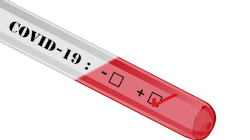Meet the Mechanic Who Looks After the Planes Carrying Coronavirus Tests
Ben Horning unwinds during a 15-minute drive home from work at Reading Regional Airport, and a day of inspecting and repairing airplanes that ferry coronavirus samples to laboratories around the nation.
“For myself, my drive home from work is my reset time,” Horning said of his ride to Cumru Township. “There is no traffic. Once I’m home, I don’t think about the situation with the pandemic. I have plenty to do.”
Horning and his family — wife, Emily; daughter Anna-Marie, 11; and son, Zachary, 9 — keep busy renovating their home and gardening. He also plays violin with his daughter.
He’s also started building bee colonies in his yard.
“We never have a shortage of things to do,” he said.
On Tuesday, the family took a walk and worked outside. They played with their English lab, Vinny.
Even with all the activities at home, Horning can’t help but be reminded of work when he hears the planes overhead during the late evening hours.
The 44-year-old's work is making sure all of Quest Diagnostics' airplanes are in condition to fly the samples to testing sites around the nation.
He works from 6 a.m. to 4:30 p.m. inspecting and repairing planes.
“Our job … is to find issues before they happen," he said. "We do inspections after every flight, checking for oil leaks and any other problems. We want to keep everything as safe as possible.”
The planes from all over the nation are rotated into the airport for inspection. Quest flies Pilatus PC-12s, which carry a large number of specimens; Beechcraft Barons, for shorter flights; and Embraer Phenom 100 jets.
The Quest ground couriers drop off specimens collected at regional sites during the day.
Pilots arrive later in the afternoon to fly the specimen-laded planes to laboratories.
“The logistics is mind-boggling,” said Horning, who grew up in Caernarvon Township, Lancaster County.
Planes flying out of Reading Regional in Bern Township go to all sites in the eastern and central U.S.
Horning developed an interest in flying when a friend flew planes at the Morgantown Airport, where Horning learned to fly.
He then got his pilot’s license from the Federal Aviation Administration and later earned a mechanics license at Upper Bucks Institute of Aeronautics.
He started out working at the Reading Air School of Flight.
In 2008, Horning landed a job as a mechanic for Quest.
Twelve years later, Horning says, he still loves his job.
“No day is the same,” he said. “We are always learning.”
———
©2020 the Reading Eagle (Reading, Pa.)
Visit the Reading Eagle (Reading, Pa.) at readingeagle.com
Distributed by Tribune Content Agency, LLC.
